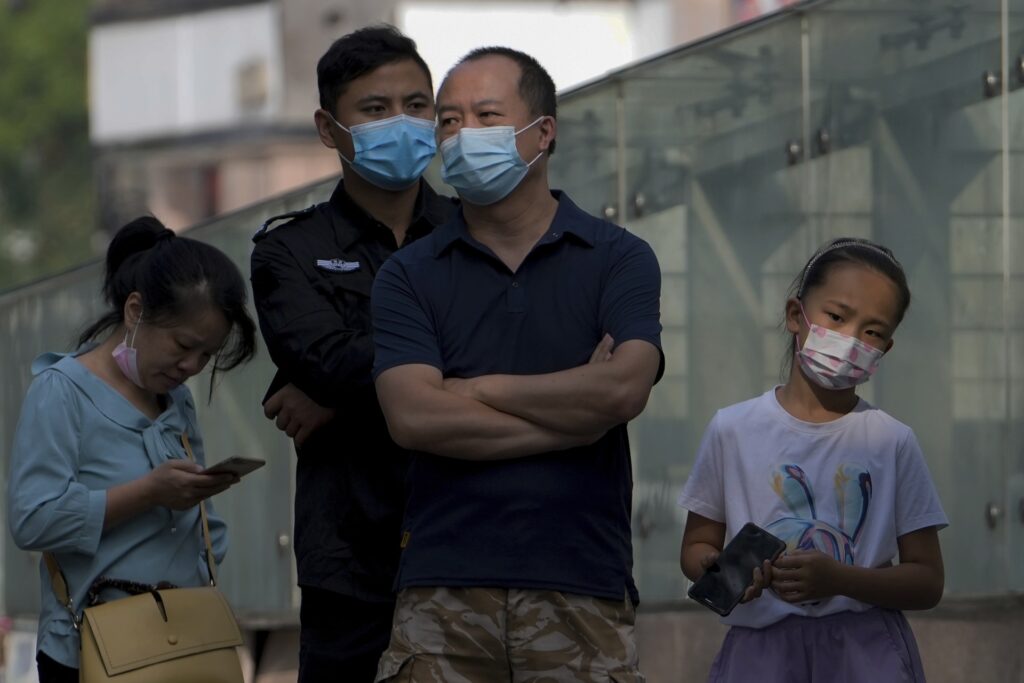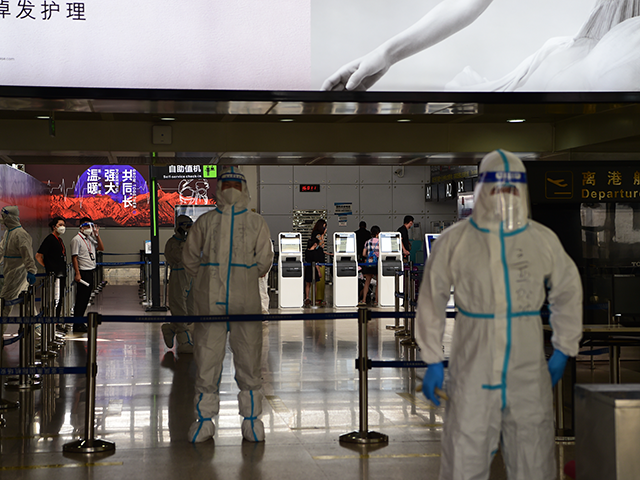The endless nightmare of China’s “zero Covid” coronavirus lockdowns continued this week, as millions of people in major cities were marched back into quarantine restrictions.
A rare street protest broke out in the city of Chongqing on Saturday night, prompting local officials to belatedly lift restrictions that ran for ten days after the last case of Chinese coronavirus was detected.
Almost four million people were ordered on Tuesday to quarantine at home for a week in Hebei, the province that surrounds Beijing. Another 13 million were ordered to undergo mandatory testing in the port city of Tianjin.
The southern tech hub of Shenzhen shut down the world’s largest electronics market on Monday, suspended public transportation, and locked down entire neighborhoods for at least the remainder of this week.
Residents of the quarantined Shenzhen neighborhoods were told they could only leave their houses for coronavirus testing. Businesses and restaurants were closed and mass transportation was shut down. Government workers quickly erected fearsome metal barriers around the quarantine zones, some of them featuring barbed wire.
“The upcoming period will be the most stressful, high-risk and grim period for epidemic prevention and control in our city,” a Shenzhen health official said at a press conference on Monday.
Lockdowns were also announced on Tuesday in the northeastern port city of Dalian, the northern city of Shijiazhuang, and Chengdu in the southwest. Chengdu, a provincial capital with a population of about 21 million, said it would delay the beginning of its fall school semester.

Residents wearing face masks wait in line to get their routine COVID-19 throat swabs at a coronavirus testing site in Beijing, Tuesday, Aug. 30, 2022. (AP Photo/Andy Wong)
Xining, another provincial capital with a population of 2.5 million, ordered lockdowns until Thursday in several areas and suspended public transportation.
The Chinese public is increasingly displeased with the endless “zero Covid” lockdowns, which are supposedly imposed after very small numbers of coronavirus cases are reported by the always-unreliable Chinese government. Tianjin, for example, ordered mass testing for 13 million people after supposedly discovering only 51 “mild” cases of Chinese coronavirus. Shenzhen only admitted to having 35 infections among its 18 million citizens when it locked down.
Disgruntled citizens also complained about the lack of warning before shutdowns, which Chinese officials prefer to impose by surprise because they fear residents might flee districts and cities.
“The notice to close came abruptly, we only had a few hours to put our stock into warehouses and lock up,” a merchant at Shenzhen’s tech market told Agence France-Presse (AFP).
In Chongqing, riot police were deployed on Saturday night to control an angry group of residents who said their compound was kept under quarantine even though no one has tested positive for Chinese coronavirus in at least ten days.
“Lots of people are kicking up a fuss … the SWAT team is here,” one protester remarked in a viral video of the demonstration. Another complained that entire districts have been locked down after a single positive test result.
China’s endless waves of mass coronavirus testing are a further source of misery, especially in areas suffering under triple-digit temperatures from the current heat wave. Both citizens and hazmat-suited health workers have been filmed collapsing from the heat.
The Chinese Communist Party and its dictator Xi Jinping adamantly refuse to admit their zero-Covid lockdown strategy is anything but a complete success, especially with Xi preparing to seize an unprecedented third term in power at the five-year Party Congress. The Chinese Politburo on Monday announced October 16 as the starting date for the week-long event.
While China’s captive citizens can only look through the bars of the apartment-prisons with envy at a world that has long since moved on from the Wuhan pandemic, Chinese state media continues pushing the Communist line that other nations should be locking down more often – and not just for Chinese coronavirus.
The Chinese Communist Party’s People’s Daily on Tuesday harangued the United States for not using stricter measures, including mass testing and quarantines, to combat the all-but-forgotten scourge of monkeypox:
With the soaring number of infections and slow response, it is worrying many public health experts that the U.S. might repeat its failure in COVID-19 control.
Monkeypox virus is not new, and both testing measures and vaccines are available. Even so, the U.S. government still missed the best opportunities to put the disease under control. From reporting the first local case on May 18, it took more than two and a half months for the country to declare monkeypox a public health emergency.
American media listed the poor performance of the U.S. in monkeypox response, such as insufficient testing capacity, inefficient distribution of vaccines, high medical expenses and lack of government-public communication, which exposed the loopholes of the U.S. health system.
The People’s Daily threw in Beijing’s favorite talking point, arguing that the U.S. has no business lecturing China for its appalling human rights violations when it fails to deliver the “human right” of zero-Covid and zero-monkeypox to its own citizens.
The Communist paper even tried ginning up a racism argument with monkeypox by claiming it disproportionately infects black Americans, so their racist government does not care about it:
For instance, 82 percent of monkeypox cases in Georgia are among African Americans, who account for only 1/3 of the state’s population, and around 20 percent of North Carolina’s population are identified as Black, who make up over 70 percent of the state’s monkeypox infections.
This is another piece of evidence suggesting that U.S. failures in disease control are in direct relation with the country’s systemic racial discrimination.
In truth, the monkeypox outbreak was never big enough, or dangerous enough, to hold the attention of the American public for long. Contrary to the frantic hyperventilation from the People’s Daily, the small number of monkeypox infections is getting smaller, in both the U.S. and Europe. The very first possible death from monkeypox in the United States was reported in Texas on Tuesday, and that person had a severely compromised immune system.

COMMENTS
Please let us know if you're having issues with commenting.